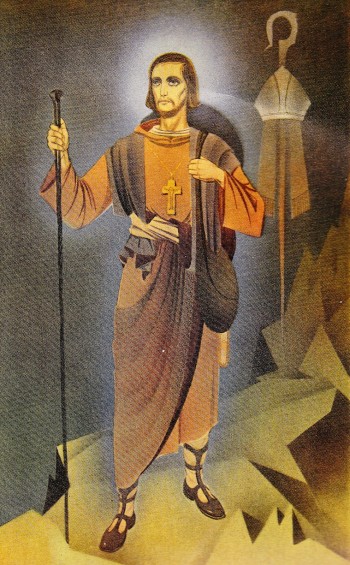An Irish Bishop who died in Italy
 Blessed Thaddeus McCarthy
Blessed Thaddeus McCarthy
We keep the commemoration of Blessed Thaddeus Machar (McCarthy) today, and I had to admit to knowing next to nothing about the holy and much persecuted bishop of Ross, Cork, and Cloyne. The fact, however, that his Mass is endowed with proper orations and with a proper Gospel (Matthew 10:23–28) intrigued me. This would indicate that he has more than a passing importance. A little research produced the following biographical information.
Bishop Thaddeus McCarthy, the young Irish prelate whose immemorial cult was confirmed by Pope Leo XIII in 1896, was born in the middle of the fifteenth century. He studied theology first under his uncle, one Canon Thady McCarthy, and then in Paris and in Rome; at the age of 27 he was named bishop of Ross by Pope Sixtus IV, and consecrated in Rome. Returning to Ireland, he discovered that his see was already in the possession of one Hugh O’Driscoll, also appointed to it by the same Pope Sixtus IV. It would seem that news had reached Rome of the death of Hugh O’Driscoll, either by simple misinformation or by political intrigue. Bishop O’Driscoll assumed that Thaddeus was an imposter and in 1488 obtained his excommunication by Pope Innocent VIII. Thaddeus appealed the excommunication; a Roman commission judged in his favour , and in 1490 he was named bishop of Cork and Cloyne.
A Wandering Bishop
Bishop Thaddeus attempted to take possession of his new see but was prevented from entering his cathedral by supporters of Gerald Fitzgerald who, with the support of local chieftains, had usurped his jurisdiction over the diocese of Cork and Cloyne. For two years, Bishop Thaddeus wandered about his diocese, attempting to win the recognition of his faithful, but to no avail. Not daunted, he set off for Rome to relate his troubles to Pope Innocent VIII. The Pontiff gave him a new document dated 18 July, 1492, and ordered the powerful Gerald Earl of Kildare to protect Thaddeus, to support him, and to restore him to his rightful place as Bishop of Cork and Cloyne.
The Pilgrim
Fearing that an attempt would be made on his life, Thaddeus disguised himself as a humble pilgrim, and set out on foot from Rome. On the evening of 24 October 1492, an exhausted Thaddeus arrived at a hostel for pilgrims in Ivrea. He was wearing the hooded habit of a pilgrim with its distinctive sign of the oyster shell. The innkeeper received the poor pilgrim warmly and provided him with a room for the night. At dawn, a strange and wonderful light was seen shining from the room. Upon entering it, the innkeeper found the lifeless body of 37 year old Thaddeus McCarthy, radiant with a heavenly beauty. The local bishop was apprised of the phenomenon; he had, in fact, dreamed that very night of an unknown bishop ascending into the glory of heaven. He recognized Thaddeus as the bishop of his dream. Further investigation revealed that Thaddeus’ wallet contained the papal documents recognizing him as bishop of Cork and Cloyne, and an episcopal ring. Clothed in episcopal robes, Thaddeus’ body attracted crowds of the local faithful to the cathedral where he lay in state. He was buried in the cathedral of Ivrea; his tomb became a place of extraordinary graces and miracles.
A Pontiff Between Ireland and Italy
In 1742, when the tomb of Thaddeus McCarthy was opened, his body was found to be incorrupt. Devotion to the Irish bishop developed and in 1847 the clergy and faithful of Ivrea donated a large amount of money for victims of the Great Hunger in Ireland. The contact between Ireland and Ivrea resulted in a movement for the beatification of Bishop Thaddeus. In 1896, Pope Leo XIII confirmed his immemorial cult. Major relics of the Blessed were sent from Ivrea to the church at Cork, Ross, and Cloyne.
Blessed Thaddeus McCarthy is known as The White Martyr of Munster because the mental and physical sufferings that he endured with heroic patience. He is a patron of people in every sort of affliction, especially of those suffering rejection, homelessness, calumny, and exile. Here is the liturgical collect for his feast:
O God, who didst adorn Blessed Thaddeus, Thy Confessor and Thy Bishop with invincible fortitude in bearing adversity,grant, we beseech Thee, that following his example as we make our pilgrim way upon earth, we may prevail mightily over the things that come against us.
One will recognize in the Collect, the allusion to Romans 8:35–39:
Who then shall separate us from the love of Christ? Shall tribulation? or distress? or famine? or nakedness? or danger? or persecution? or the sword? (As it is written: For thy sake we are put to death all the day long. We are accounted as sheep for the slaughter.) But in all these things we overcome, because of him that hath loved us. For I am sure that neither death, nor life, nor angels, nor principalities, nor powers, nor things present, nor things to come, nor might, nor height, nor depth, nor any other creature, shall be able to separate us from the love of God, which is in Christ Jesus our Lord.

Blessed Thaddeus, pray for those who, though struggling to be faithful to the Bridegroom, are calumnied, even by thy own priests. Through Christ Our Lord, amen.
Thank you Fr Mark for this post – please pray for those who are seeking to convert to the Catholic Church and meet great opposition from friends, family or in the work place – pray especially for Anglican ministers and their parishioners